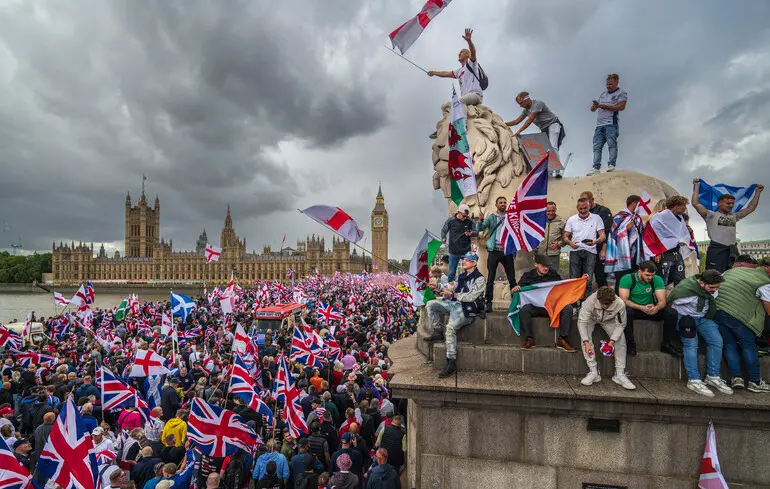Migration Crisis in the UK: Protests, Political Shifts, and National Identity

On September 13th, a large-scale public demonstration titled ‘Let’s Unite the Kingdom’ took place in London, gathering thousands of Britons and serving as a symbol of growing public discontent regarding pressing socio-political issues.
This massive rally was not only a protest against uncontrolled migration but also a mirror reflecting deeper societal sentiments that have long been simmering within the UK’s Brexit-era society.
Participants gathered to voice their opposition to government policies on migrant intake, accommodation, and integration, as well as to advocate for the preservation of national culture and traditions.
A prominent figure among the organizers was the far-right activist Tommy Robinson, which sparked some criticism that linked the event to fascist rhetoric and suspected external influences, including Russian circles.
It’s essential to recognize that the rally included diverse participants with different motives, not all of whom are radical.
Nevertheless, the scale of the event indicates a significant escalation of public dissatisfaction, signaling societal shifts and offering ominous signs of potential political reconfigurations in Britain.
This protest represented a political earthquake that should not be ignored and carries implications for Ukraine.
Anti-migration sentiments had been growing in the country long before, with protests and pickets across towns and cities during summer, especially around hotels and centres where asylum seekers are housed at public expense.
Tensions intensified after several incidents of sexual violence reportedly committed by migrants, including a case in September involving an Ethiopian asylum seeker convicted of assault on minors and women.
His arrest in July triggered widespread protests near the hotel where he and other migrants resided.
These incidents confirmed society’s anxieties, which already had been heightened by concerns over ethnicity-based crimes.
Since August, a movement advocating for raising national flags has gained popularity, starting in Birmingham and symbolizing efforts to preserve national identity and patriotism.
Despite accusations from left-leaning opponents about xenophobia and racist undertones, conservative parties like Reform UK have expressed support for such patriotic actions.
Meanwhile, Prime Minister Kira Starmer emphasized that the UK would not ‘surrender the flag to extremists’ who use it to promote violence and intimidation.
The EU countries have also voiced opposition to Britain’s ‘one-in, one-out’ migration scheme.
From January 2024 to September 2025, over 30,000 irregular migrants arrived by boat, representing an increase from about 22,000 in the same period last year.
Since the Labour government took power, at least 50,000 individuals have illegally entered through the English Channel.
Polls show that migration has overtaken the economy and healthcare as the most urgent public concern, with nearly half of Britons (48%) naming it as a critical issue, an increase of eight points from July.
Moreover, 42% believe that the current Labour government manages immigration worse than the previous Conservative administration.
A majority (68%) agree that the number of arrivals by small boats has increased over the past year, and 62% think that asylum claims have also grown.
Additionally, 45% support banning new migrant arrivals and deporting most of those who entered recently.
Controversy also surrounds the appointment of Shabana Mahmood, of Pakistani descent, as Minister of Internal Affairs, responsible for policing and migration, promising a tough stance.
An equally divisive issue remains freedom of speech — reports indicate an increase in arrests related to online hate speech, raising concerns over civil liberties.
The debate also involves how to address large migrant communities that remain unintegrated and form parallel social clusters, potentially threatening national cohesion.
These dynamics point toward shifts in the political landscape, with recent opinion polls favoring right-wing Reform UK, which unofficially supported the protests and could soon influence future governance.
For Ukraine, this signals the necessity of monitoring political developments in Britain, especially as the right might come to power after upcoming elections.
Historically, Britain’s political elites and mainstream parties have preferred to silence or downplay issues linked to mass migration from different cultural backgrounds.
However, ignoring the consequences of multiculturalism and ineffective migration policies is no longer viable.
Open discussions and effective measures are now vital to prevent radicalization, external manipulation, and societal upheaval.
British society retains a strong desire to uphold its national identity, cultural heritage, and traditional way of life, fearing that in a few decades mass migration could erode its ethnic and civilizational uniqueness, turning the native population into a minority.
These concerns must be acknowledged and addressed in the country’s future policy strategies.

